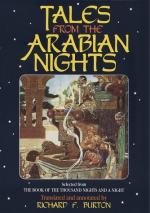[FN#42] Possibly taken from the Lions’ Court in the Alhambra=(Dar) Al-hamra, the Red House.
[FN#43] Arab. “Shazarwan” from Pers. Shadurwan, a palace, cornice, etc. That of the Meccan Ka’abah is a projection of about a foot broad in pent-house shape sloping downwards and two feet above the granite pavement: its only use appears in the large brass rings welded into it to hold down the covering. There are two breaks in it, one under the doorway and the other opposite Ishmael’s tomb; and pilgrims are directed during circuit to keep the whole body outside it.
[FN#44] The “Musafahah” before noticed, vol. vi., p. 287.
[FN#45] i.e. He was confounded at its beauty.
[FN#46] Arab. “’Ajib,” punning upon the name.
[FN#47] Arab. “Zarraf” (whence our word) from “Zarf"=walking hastily: the old “cameleopard” which originated the nursery idea of its origin. It is one of the most timid of the antelope tribe and unfit for riding.
[FN#48] Arab. “Takht,” a useful word, meaning even a saddle. The usual term is “Haudaj"=the Anglo Indian “howdah.”
[FN#49] “Thunder-King,” Arab. and Persian.
[FN#50] i.e. “He who violently assaults his peers” (the best men of the age). Batshat al- Kubra=the Great Disaster, is applied to the unhappy “Battle of Bedr” (Badr) on Ramazan 17, A.H. 2 (=Jan. 13, 624) when Mohammed was so nearly defeated that the Angels were obliged to assist him (Koran, chapts. iii. 11; i. 42; viii. 9). Mohammed is soundly rated by Christian writers for beheading two prisoners Utbah ibn Rabi’a who had once spat on his face and Nazir ibn Haris who recited Persian romances and preferred them to the “foolish fables of the Koran.” What would our forefathers have done to a man who spat in the face of John Knox and openly preferred a French play to Pentateuch ?
[FN#51] Arab. “Jilbab” either habergeon (mail-coat) or the buff-jacket worn under it.
[FN#52] A favourite way, rough and ready, of carrying light weapons, often alluded to in The Nights. So Khusrawan in Antar carried “under his thighs four small darts, each like a blazing flame.”
[FN#53] Mr. Payne very reasonably supplants here and below Fakhr Taj (who in Night dcxxxiv is left in her father’s palace and who is reported to be dead in Night dclxvii.) by Star o’ Morn. But the former is also given in the Bul. Edit. (ii. 148), so the story teller must have forgotten all about her. I leave it as a model specimen of Eastern incuriousness.
[FN#54] There is some chivalry in his unwillingness to use the magical blade. As a rule the Knights of Romance utterly ignore fair play and take every dirty advantage in the magic line that comes to hand.
[FN#55] Arab. “Hammal al-Hatabi"=one who carries to market the fuel-sticks which he picks up m the waste. In the Koran (chaps. cxi.) it is applied to Umm Jamil, wife of Mohammed’s hostile cousin, Abd al-Uzza, there termed Abu Lahab (Father of smokeless Flame) with the implied meaning that she will bear fuel to feed Hell-fire.




